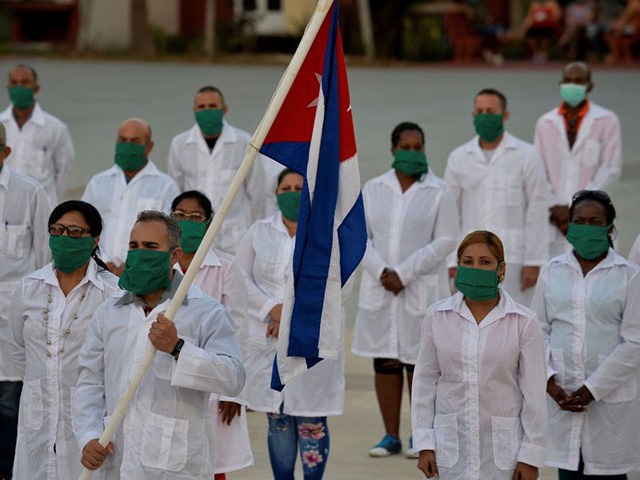The human rights organization Cuban Prisoners Defenders published a report Tuesday accusing the Mideast emirate of Qatar of funding and benefiting from Cuba’s slave doctor industry — and forcing enslaved health workers to promote Doha’s “political agendas.”
The full report also accused the local government of Calabria, Italy, and the Mexican government under far-left President Andrés Manuel López Obrador, of propping up Cuba’s multi-billion-dollar health worker slave trade. The impoverished communist island has for decades styled itself a global medical leader despite the destitute state of its healthcare system in large part through its foreign medical missions, which enslave doctors and other health workers in friendly countries. In 2019, the Wall Street Journal estimated that Cuba makes $11 billion a year on the health worker slave trade.
Cuban health workers abroad face imprisonment or other legal consequences if they violate restrictive rules prohibiting them from driving without authorization, befriending locals, or leaving their residences during their curfews. Those who attempt to defect face an eight-year ban from entering Cuba, often meaning that defection leaves them unable to be present for their children’s childhoods.
Some defectors have nonetheless fled the program and attempted to sue the Cuban state for violating their human rights. Their testimonies have resulted in exposing a system that not only abuses its workers, but falsifies medical data to make Cuba appear more successful in providing health care than it actually is. Some doctors have testified to being forced to destroy medicine and claim to have administered it to patients who did not exist, increasing the number of patients those doctors “treated.”
In 2019, the Organization of American States (OAS) formally condemned Cuba for human trafficking.
Most of Cuba’s known doctor slavery operations are stationed in Latin America and Africa, where countries such as Zimbabwe, Angola, and Sierra Leone have long welcomed Cuban communist healthcare operations. The Cuban Prisoners Defenders report highlighted a large “medical collaboration” project in the heart of the Middle East, made up of over 500 health workers as of 2020.
Anonymous Cuban doctors speaking to Cuban Prisoners Defenders said that those shipped to Qatar never chose to do so and “did not know their final destination until they arrived there.”
“Their passports are permanently withheld by Cuban authorities as soon as they cross the border, and they are under constant surveillance,” the doctors reportedly said. “They are under curfew in their residences and cannot stay overnight in any place other than the one assigned by the Cuban government in Qatar.”
Notably, in addition to any medical work they are forced into, the doctors said they had to engage in political propaganda projects – similar to what defecting doctors have testified to experiencing in leftist countries such as Bolivia and Venezuela. Unlike those socialist governments, Qatar is an Islamist state run under a sharia system, leaving open-ended exactly how the Cuban doctors were expected to support the emirate.
“They are forced to fulfill political agendas and tasks among the native population, so they are used to influence the local politics of the rulers,” the doctors told Cuban Prisoners Defenders.
The doctors said that the Castro regime keeps about 90 percent, sometimes up to 94 percent, of the salaries that Qatar offers them as part of their contracts.
Cuban Prisoners Defenders noted that the treatment of doctors in foreign countries – particularly Cuba’s contractual insistence that Cuban law apply to them abroad, rather than the law of the nations they are in – is a violation of international law and often a violation of the laws of countries accepting the slave doctors. In the case of Mexico, the slave doctor contracts explicitly demand that the victims “comply with Cuban law in case they decide to marry a foreign natural person,” which violates Mexican law.
The NGO noted in its report that it has submitted a complaint to the International Criminal Court (ICC) regarding the program, accusing Cuba of “human trafficking, slavery, persecution and other inhumane acts and crimes against humanity as defined by Article 7 of the Rome Statute.”
The accusations against Qatar follow a year of heightened global awareness of that monarchy’s human rights abuses in light of it hosting the 2022 FIFA World Cup, the most prestigious soccer tournament on earth. To host the tournament, Qatar invested heavily in building state-of-the-art facilities including hotels and stadiums, on the backs of thousands of migrant workers. Human rights groups, citing protests by those workers and evidence of mass abuses, have accused Qatar of enslaving them. The workers, for much of the time the World Cup facilities were under construction, were forced into a system known as kafala in which employers confiscated passports and essentially prevented workers from leaving their jobs or complaining if they did not receive their salaries.
The Qatari government has since formally terminated kafala and admitted to up to 500 worker deaths during World Cup construction, but journalists estimate the true death toll is in the thousands and protesting workers say they still do not enjoy basic human rights in the country.
The Castro regime was among the world’s most vocal supporters of Qatar’s World Cup hosting duties.
“We salute the brotherly Qatari nation and government for the great effort realized to organize this appointment, the first time in an Arab nation,” Cuban External Affairs Minister Bruno Rodríguez said in November.

COMMENTS
Please let us know if you're having issues with commenting.